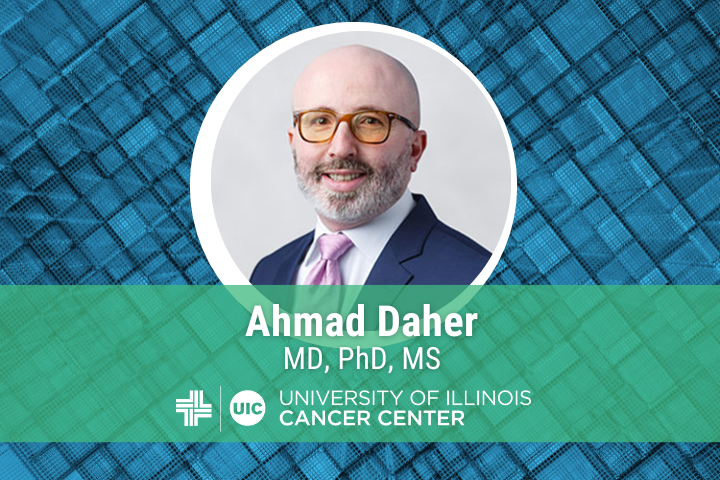
Treating brain tumors can be difficult, but new University of Illinois Cancer Center member Ahmad Daher is never one to back down from a challenge.
As a neuro-oncologist, Daher, MD, PhD, MS, assistant professor of neurology and rehabilitative medicine at the UIC College of Medicine, cares for patients with various primary brain tumors, including gliomas (glioblastoma, astrocytoma, oligodendroglioma); meningioma; and central nervous system (CNS) lymphoma, among others. Daher conducted numerous cancer studies while in graduate school, and as time passed the more his interest in the deadly disease grew. He knew then which direction his career was headed.
“I realized I wanted to tackle cancer from multiple angles, by working on the molecular mechanisms that underlie its formation and resistance to treatment, and by keeping the human element of the disease front and center through direct interactions with patients who suffer from it,” said Daher, who came to UIC after serving as neuro-oncology medical director at Hartford HealthCare Medical Group in Connecticut.
“While in medical school I became aware of the field of neuro-oncology and the limited options for those patients, as well as the limited number of practitioners who specialize in it compared to other cancers. This field perfectly complemented my separate interest in neuroscience.”
Along with his work as a clinician, Daher is also a skilled scientist. He is currently working on three projects that will help him understand how the molecular composition of brain tumors – particularly glioblastoma – can explain why patients with the same disease can have different outcomes despite receiving the same therapy, and how that molecular makeup can result in more targeted personalized therapies.
The first involved collecting tissue samples from GBM patients with longer-than-expected survival versus shorter-than-expected survival and those who developed radiation-related changes – a common occurrence in GBM patients which resembles disease progression, but really is a reflection of the treatment working well – compared to patients without radiation-related changes. Daher has completed the molecular analysis on each group and is awaiting finalization of the comparison between the subgroups to identify markers specific for each outcome. His goal is to publish the results later this year.
In two additional projects, which are currently in the planning phases, Daher will analyze blood samples collected from GBM patients throughout their treatment at UIC to discover whether molecular markers may exist. The markers can predict when the disease will progress earlier than is seen on imaging studies, currently the traditional progression in GBM, Daher said.
During a second project, Daher will develop GBM cell lines using tumor tissue surgically removed upon diagnosis. Drug screening will be performed on the cell lines in a laboratory setting to identify novel promising drug options and to study the molecular makeup of specific GBM cell lines that were particularly sensitive to certain drugs, “compared to those that were particularly resistant to it,” Daher said. “Data from projects such as this can help develop GBM-drug specific “signatures” for resistance and response that would inform our decision to favor certain drugs over others during treatment.”
Daher is also experienced in conducting clinical trials. He is currently the principal investigator for two upcoming national interventional glioblastoma trials, one for recurrent GBM and one for newly diagnosed GBM. He also serves as co-principal investigator on four national interventional primary brain tumor trials: one for meningioma; one for newly diagnosed GBM; one for recurrent glioma; and one is an investigational imaging trial.
He has also developed an investigator-initiated trial concept for a Phase 1 and 2 trial combining the drugs abemaciclib and osimertinib in patients with recurrent GBM. He is collaborating with the Big Ten Cancer Research Consortium’s Brain Tumor Group to open it across all member institutions. While at Hartford HealthCare Medical Group, Daher was similarly involved in several national trials for patients with primary brain tumors, serving as a site principal investigator.
Daher was drawn to the cancer center and UIC for numerous reasons, among them treating an underserved population. He will be afforded the opportunity to divide his time between his laboratory and the clinic “without compromising on either aspect of what I want from my career, which is not common in this field or in medical careers in general. I’m excited to begin my career at UIC.”
